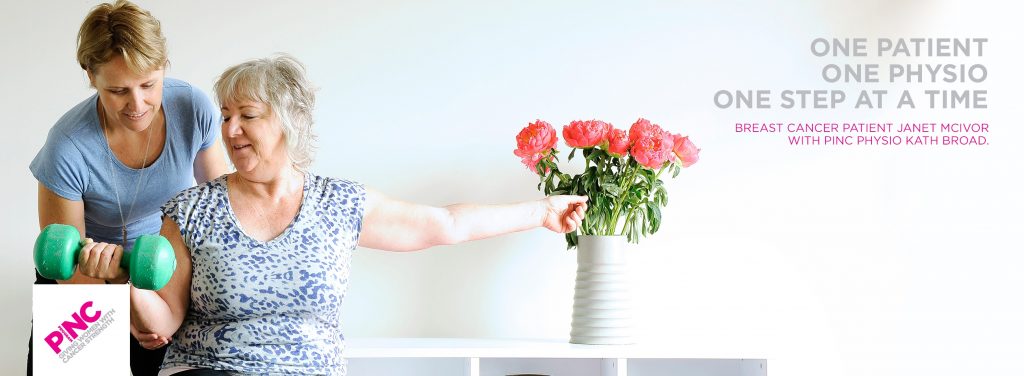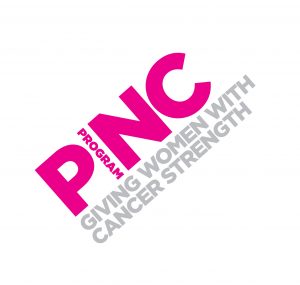Written by Julie Atkin: PINC physiotherapist, Senior Women’s Health Physiotherapist.
Receiving a cancer diagnosis is a life-changing event that most times happens very suddenly and unexpectedly. For most people there has been no time to prepare mentally, emotionally or physically for the fight that is to come. Life is suddenly all about survival, with a round-about of medical tests, surgeries, and treatments like medication, chemotherapy and radiation. There is a wonderful team of doctors and nurses fighting alongside you to beat this disease – focussed on treating and eliminating those cancerous cells to prevent the disease from taking your life. And that is as it should be.
But who is helping you to be able to physically capable of continuing to “do” your life as you fight and beyond?
This disease, and the treatments undertaken to conquer it, very often produce unwanted, debilitating side effects, that adversely impact on your ability to go about doing normal everyday activities – like working, caring for your family and home, and recreational activities that bring joy and fulfilment.
The side effects are many, but the most common are:
- Pain
- Reduced range of motion, including scar adhesions and cording
- Decreased muscle tone and strength – which contributes to poor core and pelvic floor strength, poor posture and reduced fitness
- Lymphoedema
- Osteoporosis
- Neuropathy
- Fatigue
- Nausea
- Depression and reduced confidence
- Decreased cognitive function (‘chemo brain’)
- Reduced sleep quality
How can a PINC certified physiotherapist help?

This is where physiotherapists come in…. in particular PINC Cancer Rehabilitation trained physiotherapists who are perfectly placed to help you address these unwanted side effects as they arise. These therapists have taken their existing knowledge and training in pain management, mobility, strength and improving function and supplemented it with additional education to understand the special challenges that face you while going through your cancer treatment journey.
The time from receiving that diagnosis to reaching survivorship phase spans many months, and these side effects can have a significant impact on daily life – preventing you from living your best possible life at that time. It’s so important to get help as early as possible to minimise the impact of these side effects as much as possible, and ultimately live a better Quality of Life.
PINC Cancer Rehabilitation physiotherapists have a thorough understanding of what is happening in every stage of your fight against this disease. From pre-op to post-op treatment, throughout oncology treatments and into the recovery and survivorship stages. They understand what the limitations are, and tailor treatments to you.
More specifically…
We look at you as a whole person – talk to you about your goals, what you want to achieve, what you are interested in doing – both for the short-term and long-term.
We are able to help with post-operative pain and restore range of motion which could be limited by pain, scar adhesions, cording or muscle inhibition and reduced strength.
Poor posture and reduced core strength can cause pain, impact on effective breathing, and reduce your ability to perform normal day to day activities. We can help retrain your core muscles (including pelvic floor) to gradually rebuild the foundations that you will need to get on with day to day life.
We help retrain your breathing – which has been proven to help with relieving pain, improving posture, improving oxygenation which in turn assists cognitive function, relieving anxiety and depression, promotes relaxation and helps with fatigue and sleep.
Gentle, and appropriately designed exercise therapy is vital during treatment and beyond. There is a wealth of evidence that exercise during cancer treatment can help improve energy levels and reduce the impact on physical function that the disease and treatment can have. So many of the physical side effects of the disease and its treatment can be reduced with exercise….. it improves strength and mobility and therefore the ability to engage in meaningful activities, decreases treatment-induced joint pain, improves bone mineral density (reducing the development of osteoporosis), and assists with lymphoedema symptoms. Not only that, it has benefits in improving mood and self confidence, reducing fatigue and improves sleep.
Furthermore, there is evidence that exercise during cancer treatment reduces the risk of dying from the disease and of having recurrence of it.
What should you do next?
Wonderful medical advances have meant that more and more, the survival rate of this conditions has increased exponentially, but it still has a significant impact on your body and your ability to “do life” as you go through treatment and beyond. We want to see you live the best possible life you can through this time, and it is entirely possible to limit the impact it has to have on you…. You don’t have to do it alone, your PINC Cancer Rehabilitation Physiotherapist understands the struggles involved and is here to help guide you through all the stages with treatment that is designed just for you.
At our clinic we can see you via Telehealth which is particularly good if you are immunocompromised, or in clinic. If you would like any more information about how we can help, or would like to book in with Julie, please email enquiries@fizzioforlife.com.au for a confidential discussion with our staff, or call the office on 38053223.



